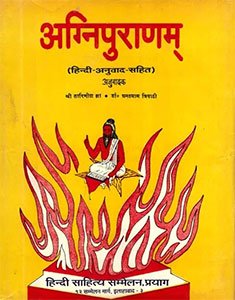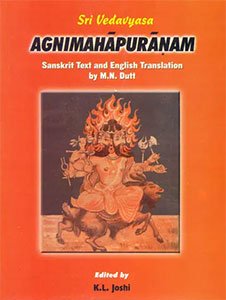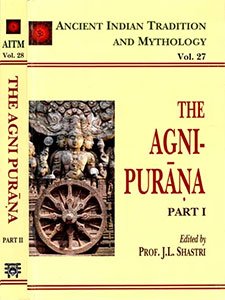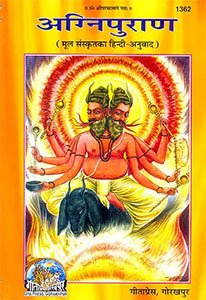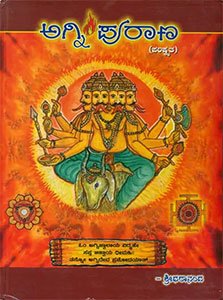Agni Purana [sanskrit]
97,288 words
This Sanskrit edition of the Agnipurana. It is one of the traditional eighteen Mahapuranas presented as an encyclopedia of ancient Indian history and knowledge. It contains either 382 or 383 chapters and over 10.000 verses (Sanskrit Shlokas).
Verse 310.19
ओं ह्रीँ ह्रूँ ह्रः हृदयं हां हश्चेति शिरः । ह्रीँ ज्वल ज्वल शिखा ।
स्यात् कवचं हनुद्वयम् । हीँ श्रीँ शून्नेत्रत्रयाय विद्यानेत्रं प्रकीर्त्तितम् ।
क्षौँ हः खौँ हूँ फडस्त्राय गुह्याङ्गानि पुरा न्यसेत् ।
त्वरिताङ्गानि वक्ष्यामि विद्याङ्गानि श्रृणुष्व मे ।
आदिद्विहृदयं प्रोक्तं त्रिचतुःशिर इष्यते ॥ १९ ॥
oṃ hrīṃ hrūṃ hraḥ hṛdayaṃ hāṃ haśceti śiraḥ | hrīṃ jvala jvala śikhā |
syāt kavacaṃ hanudvayam | hīṃ śrīṃ śūnnetratrayāya vidyānetraṃ prakīrttitam |
kṣauṃ haḥ khauṃ hūṃ phaḍastrāya guhyāṅgāni purā nyaset |
tvaritāṅgāni vakṣyāmi vidyāṅgāni śrṛṇuṣva me |
ādidvihṛdayaṃ proktaṃ tricatuḥśira iṣyate || 19 ||
The Sanskrit text of Verse 310.19 is contained in the book The Agni Puranam (Anandashram Edition) by Shri Chimna Apate (श्री चिमणा आपटे). This book is available online or you could buy the latest edition:
Read online Buy now! The Sanskrit text by Shri Chimna Apate (श्री चिमणा आपटे) (1987)
Glossary of Sanskrit terms
Note: This extracts Sanskrit terms and links to English definitions from the glossary, based on an experimental segmentation of verse (310.19). Some terms could be superfluous while some might not be mentioned. Click on the word to show English definitions.
Hrim, Hridaya, Ceti, Shira, Shiras, Jvala, Shikha, Syat, Sya, Kavaca, Hanu, Dvayam, Dvaya, Shri, Vidya, Anetra, Prakirttita, Ksha, Kshi, Aum, Kha, Hum, Phat, Astra, Guhi, Tvarita, Anga, Vidyanga, Asmad, Adi, Adin, Prokta, Catu, Catus, Ishyat,
Analysis of Sanskrit grammar
Note: this is an experimental feature and only shows the first possible analysis of the Sanskrit text (Verse 310.19). If the system was successful in segmenting the sentence, you will see of which words it is made up of, generally consisting of Nouns, Pronouns, Verbs, Participles and Indeclinables. Click on the link to show all possible derivations of the word.
- Line 1: “oṃ hrīṃ hrūṃ hraḥ hṛdayaṃ hāṃ haśceti śiraḥ | hrīṃ jvala jvala śikhā ”
- Cannot analyse om*hr
- hrīm -
-
hrīm (indeclinable)[indeclinable]
- Cannot analyse hrūm*hr
- Cannot analyse hraḥ*hṛ
- hṛdayam -
-
hṛdaya (noun, masculine)[adverb], [accusative single]hṛdaya (noun, neuter)[adverb], [nominative single], [accusative single]hṛdayā (noun, feminine)[adverb]
- hām -
-
hā (noun, feminine)[accusative single]
- haś -
-
ha (noun, masculine)[nominative single]
- ceti -
-
ceti (noun, masculine)[compound], [adverb]ceti (noun, feminine)[compound], [adverb]ceti (noun, neuter)[compound], [adverb], [nominative single], [vocative single], [accusative single]cetī (noun, masculine)[adverb], [vocative single]cetī (noun, feminine)[compound], [adverb], [vocative single]cetī (noun, neuter)[compound], [adverb], [nominative single], [vocative single], [accusative single]
- śiraḥ -
-
śiras (noun, neuter)[compound], [nominative single], [vocative single], [accusative single]śira (noun, masculine)[nominative single]
- hrīm -
-
hrīm (indeclinable)[indeclinable]
- jvala -
-
jvala (noun, masculine)[compound], [vocative single]√jval (verb class 1)[imperative active second single]
- jvala -
-
jvala (noun, masculine)[compound], [vocative single]√jval (verb class 1)[imperative active second single]
- śikhā -
-
śikhā (noun, feminine)[nominative single]
- Line 2: “syāt kavacaṃ hanudvayam | hīṃ śrīṃ śūnnetratrayāya vidyānetraṃ prakīrttitam ”
- syāt -
-
syāt (indeclinable adverb)[indeclinable adverb]syāt (indeclinable)[indeclinable]sya (noun, neuter)[adverb], [ablative single]√as (verb class 2)[optative active third single]
- kavacam -
-
kavaca (noun, masculine)[adverb], [accusative single]kavaca (noun, neuter)[adverb], [nominative single], [accusative single]
- hanu -
-
hanu (noun, feminine)[compound], [adverb]hanu (noun, masculine)[compound], [adverb]hanu (noun, neuter)[compound], [adverb], [nominative single], [vocative single], [accusative single]hanū (noun, masculine)[adverb], [vocative single]hanū (noun, feminine)[compound], [adverb], [vocative single]hanū (noun, neuter)[compound], [adverb], [nominative single], [vocative single], [accusative single]
- dvayam -
-
dvayam (indeclinable)[indeclinable]dvaya (noun, masculine)[adverb], [accusative single]dvaya (noun, neuter)[adverb], [nominative single], [accusative single]
- hī -
-
hi (indeclinable particle)[indeclinable particle]
- im -
-
i (noun, masculine)[accusative single]
- śrīm -
-
śrī (noun, feminine)[accusative single]
- Cannot analyse śūnnetratrayāya*vi
- vidyā -
-
vidya (noun, neuter)[compound], [vocative single]√vid -> vidya (absolutive)[absolutive from √vid]√vid -> vidya (absolutive)[absolutive from √vid]√vid -> vidya (absolutive)[absolutive from √vid]vidyā (noun, feminine)[nominative single]
- anetram -
-
anetra (noun, masculine)[adverb], [accusative single]anetra (noun, neuter)[adverb], [nominative single], [accusative single]
- prakīrttitam -
-
prakīrttita (noun, masculine)[adverb], [accusative single]prakīrttita (noun, neuter)[adverb], [nominative single], [accusative single]
- Line 3: “kṣauṃ haḥ khauṃ hūṃ phaḍastrāya guhyāṅgāni purā nyaset ”
- kṣau -
-
kṣa (noun, masculine)[compound], [nominative dual], [vocative single], [vocative dual], [accusative dual]kṣa (noun, neuter)[compound], [vocative single]kṣā (noun, feminine)[nominative single]kṣi (noun, feminine)[locative single]
- aum -
-
aum (indeclinable)[indeclinable]
- haḥ -
-
ha (noun, masculine)[nominative single]
- khau -
-
kha (noun, masculine)[compound], [nominative dual], [vocative single], [vocative dual], [accusative dual]kha (noun, neuter)[compound], [vocative single]khā (noun, feminine)[nominative single]
- aum -
-
aum (indeclinable)[indeclinable]
- hūm -
-
hūm (indeclinable)[indeclinable]
- phaḍ -
-
phaṭ (indeclinable)[indeclinable]
- astrāya -
-
astra (noun, neuter)[dative single]
- guhyāṅ -
-
guhī (noun, feminine)[locative single]
- gāni -
-
ga (noun, neuter)[nominative plural], [vocative plural], [accusative plural]√gā (verb class 2)[imperative active first single]√gā (verb class 2)[imperative active first single]
- purā* -
-
- Cannot analyse nyaset
- Line 4: “tvaritāṅgāni vakṣyāmi vidyāṅgāni śrṛṇuṣva me ”
- tvaritā -
-
tvarita (noun, masculine)[compound], [vocative single]tvarita (noun, neuter)[compound], [vocative single]√tvar -> tvarita (participle, masculine)[compound from √tvar]√tvar -> tvarita (participle, neuter)[compound from √tvar]tvaritā (noun, feminine)[nominative single]√tvar -> tvarita (participle, masculine)[vocative single from √tvar class 1 verb], [vocative single from √tvar]√tvar -> tvarita (participle, neuter)[vocative single from √tvar class 1 verb], [vocative single from √tvar]√tvar -> tvaritā (participle, feminine)[nominative single from √tvar class 1 verb], [nominative single from √tvar]√tvar (verb class 1)[periphrastic-future active third single]
- aṅgāni -
-
aṅga (noun, neuter)[nominative plural], [vocative plural], [accusative plural]√aṅg (verb class 1)[imperative active first single]
- vakṣyāmi -
-
√vac (verb class 2)[future active first single]√vac (verb class 3)[future active first single]√vah (verb class 1)[future active first single]
- vidyāṅgāni -
-
vidyāṅga (noun, neuter)[nominative plural], [vocative plural], [accusative plural]
- Cannot analyse śrṛṇuṣva*me
- me -
-
ma (noun, masculine)[locative single]ma (noun, neuter)[nominative dual], [vocative dual], [accusative dual], [locative single]mā (noun, feminine)[nominative dual], [vocative single], [vocative dual], [accusative dual]asmad (pronoun, none)[dative single], [genitive single]
- Line 5: “ādidvihṛdayaṃ proktaṃ tricatuḥśira iṣyate ”
- ādi -
-
ādi (noun, masculine)[compound], [adverb]ādi (noun, neuter)[compound], [adverb], [nominative single], [vocative single], [accusative single]ādi (noun, feminine)[compound], [adverb]ādin (noun, masculine)[compound], [adverb]ādin (noun, neuter)[compound], [adverb], [nominative single], [vocative single], [accusative single]
- dvihṛdayam -
-
dvihṛdayā (noun, feminine)[adverb]
- proktam -
-
prokta (noun, masculine)[adverb], [accusative single]prokta (noun, neuter)[adverb], [nominative single], [accusative single]proktā (noun, feminine)[adverb]
- tri -
-
tri (noun, masculine)[compound], [adverb]
- catuḥ -
-
catur (noun, masculine)[adverb]catus (noun, neuter)[compound], [adverb], [nominative single], [vocative single], [accusative single]catu (noun, masculine)[nominative single]catu (noun, feminine)[nominative single]
- śira* -
-
śiras (noun, neuter)[compound], [nominative single], [vocative single], [accusative single]śira (noun, masculine)[nominative single]
- iṣyate -
-
√iṣ -> iṣyat (participle, masculine)[dative single from √iṣ class 4 verb]√iṣ -> iṣyat (participle, neuter)[dative single from √iṣ class 4 verb]√iṣ (verb class 6)[present passive third single]√iṣ (verb class 1)[present passive third single]√iṣ (verb class 4)[present passive third single]√iṣ (verb class 0)[present passive third single]√iṣ (verb class 0)[present passive third single]
Other editions:
Also see the following editions of the Sanskrit text or (alternative) English translations of the Verse 310.19
Agni Purana with Hindi Translation
by Tarinish Jha and Dr. Ghanshayam Tripathi (तारिणीश् झा और डॉ. घनश्याम त्रिपाठी) (2007)
Publisher: Hindi Sahitya Sammelan, Allahabad; 1199 pages; Title: अग्निपुराणम् (संस्कृत एवं हिन्दी अनुवाद);
Buy now!
Agni Purana (Two Volumes)
by M. N. Dutt (2023)
Publisher: Parimal Publication Pvt. Ltd.; Editor: K. L. Joshi.; ISBN-10: 8171101690; ISBN-13: 9788171101696; 1070 pages.
Buy now!
Agni-Purana (Set of 4 Volumes)
by N. Gangadharan (2006)
Publisher: Motilal Banarsidass Publishers Pvt. Ltd.; ISBN: Part I 8120803590 (9788120803596); Part II 8120803604 (9788120803602); Part III 8120801741 (9788120801745); Part IV 812080306X (9788120803060); 1271 pages.
Buy now!
The Agni Purana (Hindi)
by (2013)
Publisher: Gita Press, Gorakhpur; Title: अग्निपुराण (केवल हिन्दी अनुवाद); ISBN-10: 8129302934; ISBN-13: 9788129302939; 848 pages.
Buy now!
Agni Purana (Kannada)
by Sreedharananda (2013)
Publisher: Pooja Pusthaka Bhandara, Bangalore; Title: ಅಗ್ನಿ ಪುರಾಣ; 560 pages.
Buy now!Preview of verse 310.19 in Kannada sript:
ಓಂ ಹ್ರೀಂ ಹ್ರೂಂ ಹ್ರಃ ಹೃದಯಂ ಹಾಂ ಹಶ್ಚೇತಿ ಶಿರಃ । ಹ್ರೀಂ ಜ್ವಲ ಜ್ವಲ ಶಿಖಾ ।
ಸ್ಯಾತ್ ಕವಚಂ ಹನುದ್ವಯಮ್ । ಹೀಂ ಶ್ರೀಂ ಶೂನ್ನೇತ್ರತ್ರಯಾಯ ವಿದ್ಯಾನೇತ್ರಂ ಪ್ರಕೀರ್ತ್ತಿತಮ್ ।
ಕ್ಷೌಂ ಹಃ ಖೌಂ ಹೂಂ ಫಡಸ್ತ್ರಾಯ ಗುಹ್ಯಾಙ್ಗಾನಿ ಪುರಾ ನ್ಯಸೇತ್ ।
ತ್ವರಿತಾಙ್ಗಾನಿ ವಕ್ಷ್ಯಾಮಿ ವಿದ್ಯಾಙ್ಗಾನಿ ಶ್ರೃಣುಷ್ವ ಮೇ ।
ಆದಿದ್ವಿಹೃದಯಂ ಪ್ರೋಕ್ತಂ ತ್ರಿಚತುಃಶಿರ ಇಷ್ಯತೇ ॥ ೧೯ ॥
![Agni Purana [sanskrit] - book cover](/uploads/a/Agni-Purana-Sanskrit.jpg)
